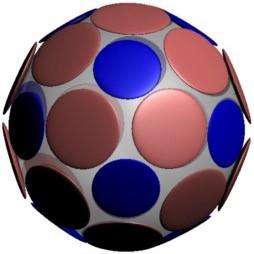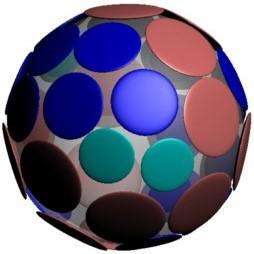Researchers study synthetic protein cages

A multidisciplinary team of mathematicians, theoretical physicists, chemists and biochemists from the University of Bristol came together to study the self-assembly of protein building into protein cages with possible applications in nanotechnology and synthetic biology.
The results are published this week in the Proceedings of the National Academy of Sciences.
The research is led by Professors Tanniemola Liverpool and Noah Linden from the School of Mathematics and Professor Dek Woolfson from the Schools of Chemistry and Biochemistry, and builds on previous research, performed in Professor Woolfson's laboratory on synthetic protein cages. The team's findings shed light on understanding the regularity of the self-assembled cages and can potentially lead to new approaches in protein design for self-assembly and can drive new experimental methodologies.
Commenting on the research, lead author, Dr Majid Mosayebi, a Postdoctoral Research Associate in Theoretical Biophysics in the School of Mathematics, said:
"The design and construction of man-made structures at microscopic scales is one of the key goals of modern nanotechnology. With nature as inspiration, synthetic biological building blocks have recently been designed that self-assemble into quasi-spherical shells or cages.

"While many natural protein building blocks self-assemble into highly symmetric ordered shells (e.g. viruses), our study shows that surprisingly even a small amount of (unavoidable) flexibility in the synthetic protein building blocks leads to stable disordered configurations.
"Our work focuses on how robust the symmetry of the cage is given the flexibility of the protein building blocks. Our work sheds light on the self-assembly mechanisms in these cages, which can have widespread applications in material science and synthetic biology, including fabrication of metamaterials, targeted drug delivery, vaccine design and nanoreactors."
More information: Majid Mosayebi el al., "Beyond icosahedral symmetry in packings of proteins in spherical shells," PNAS (2017). www.pnas.org/cgi/doi/10.1073/pnas.1706825114
Journal information: Proceedings of the National Academy of Sciences
Provided by University of Bristol





















